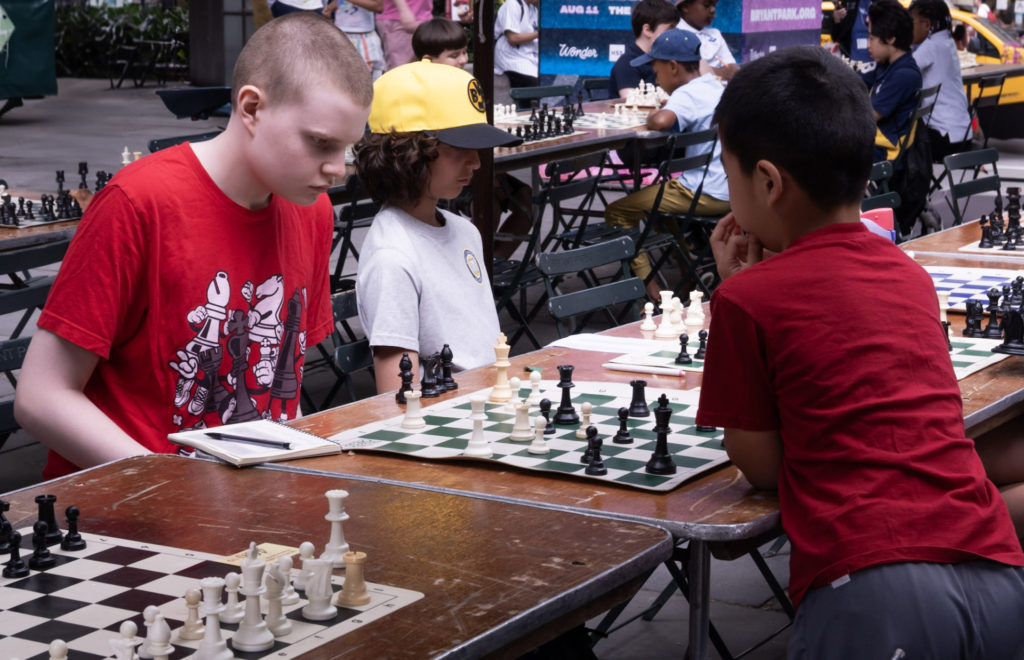
Popular Online Extracurricular Activities for High Schoolers
Posted by
Online extracurricular activities are virtual pursuits that allow students to explore their interests, develop new skills, and enhance their college applications. These activities can help foster skills like time management, teamwork, and communication, and they also help students build social connections.
High school students already have busy schedules. The value of online extracurricular activities? Many are asynchronous, offering more flexibility for participants. So why else should a student try an extracurricular activity (or two or three)?
- Extracurricular classes allow students to participate in unique programs regardless of location, making it easier to balance academics with other commitments.
- Because they’re not limited by their local community, students gain access to a broader range of clubs, competitions, and specialized activities — and meet people from different cultures and backgrounds.
- Online extracurricular activities provide vital platforms for social interaction and collaboration, which can help alleviate feelings of isolation in students who may also access their regular education through online programs, such as cyber schools.
The best thing about education online? There’s something for everyone. Keep reading to learn more about some of these online activities for high schoolers.
Online extracurricular activities
Let’s look a little more deeply at what constitutes good extracurricular activities. It’s a valid question for college-bound students, and the answer goes beyond listing a club on a college application. Top universities use a tiered framework to evaluate the impact and significance of a student’s activities.
An “exceptional” extracurricular activity is defined by achievement, leadership, and impact. These activities may demonstrate national or even international-level excellence. They’re often the hook that can help an applicant stand out. Examples include:
- Winning a national award, like the Regeneron Science Talent Search or Intel Science Fair
- Qualifying for a national or international Olympiad (e.g., Coding, Math, Physics, or the Harvard Crimson Global Essay Competition)
- Founding a successful non-profit or business with a significant impact, like the young entrepreneurs competing in the Shark Tank-style KidBizCON 2025 in Washington, D.C.
High-level extracurricular activities can also demonstrate a deep commitment and success at a state or regional level. Examples include the Virtual Debate League and Model United Nations.
Simply signing up for an extracurricular isn’t enough to stand out. How might different levels of participation in an extracurricular activity look? Let’s say you competed in the debate club, both in-person and online.
- Standard: You were the team captain, won a few local competitions, and placed at a national tournament or two.
- Notable: You were the team captain and won a couple of national tournaments.
- Impressive: You’ve only competed in local tournaments but won them all; but you started your school’s debate program and grew it from a handful to 40 kids by the end of your junior year. You led fundraising efforts to help cover travel costs and entrance fees, hired coaches, and ran meetings. You and two other debaters also competed nationally and did well.

What qualifies as an extracurricular activity?
An extracurricular activity is something a student participates in outside of their mandatory academic curriculum (i.e., school). But while this definition is pretty straightforward, its interpretation varies among students and colleges.
For most high school students (and their parents), an extracurricular activity is anything you do after class that’s not for a grade. Good extracurricular activities might include school-sponsored activities as well as informal pursuits. The focus here is on participation and exploration — think joining a sports team, playing an instrument, participating in a club like robotics or drama, or volunteering at a nonprofit.
A broader interpretation might include a student’s part-time job, online learning to develop hobbies such as coding or painting, and even necessary family responsibilities, such as caring for a younger sibling or an elderly relative. The key? The activity is a consistent, meaningful use of a student’s time outside of school.
A college’s definition is more strategic and outcomes-oriented. Colleges and universities view extracurricular activities as a crucial component of a student’s application, showcasing their character, passions, and potential for impact. Admissions committees evaluate activities by what they are and, more importantly, by the student’s depth of involvement, leadership, and achievement.
Colleges use extracurriculars to understand the “whole applicant.” They want to see how a student uses their free time and if they’ve developed skills beyond the classroom. These activities demonstrate a student’s intellectual curiosity, perseverance, and ability to contribute to a community.
Extracurricular activities examples
Online extracurricular activities offer a vast array of options for students due to their “no-holds-barred” nature. There really are few limits.
- Coding & tech clubs: Learn programming languages, app development, or competitive robotics. Examples include online robotics challenges and hackathons.
- Online research: Conduct independent research with a mentor or participate in a virtual research program like the Lumiere Research Scholar Program.
- Science & math competitions: Compete in virtual science fairs, math leagues, and Olympiads.
- Tutoring: Offer academic support to younger students or peers through online platforms.
- Digital art & design: Take classes in digital drawing, graphic design, animation, or web design.
- Creative writing: Join an online writing group, publish a blog, start a podcast, or submit work to online literary magazines and contests.
- Podcasting & vlogging: Create a podcast or YouTube channel about a topic you're passionate about, such as movie reviews, cooking, or academic concepts.
- Virtual performance: Participate in online drama clubs, take dance classes via video conferencing, or join a virtual choir.
- Online volunteering: Participate in virtual volunteer opportunities like transcribing documents for the Smithsonian or helping visually impaired individuals with daily tasks through apps like "Be My Eyes."
- Virtual student government: Run for a virtual student government position to plan events and represent your peers.
- Debate & Mock Trial: Join an online debate club or mock trial team to hone public speaking and critical thinking skills.
- Social activism: Start an online petition, raise awareness for a social cause through social media campaigns, or get involved in virtual political campaigns.

In-person extracurriculars remain a classic, traditional way to build skills, make friends, and show commitment.
- School clubs: Join a club related to an academic interest (Science Olympiad, Model UN, Drama club) or a general interest (Chess club, the school newspaper, yearbook).
- Sports: Play a team or individual sport, either for your school (JV/varsity) or in a local league.
- Community service: Volunteer at a local animal shelter, food bank, or hospital. You can also organize a neighborhood clean-up or a charity event.
- Part-time jobs & internships: Work a part-time job or find an in-person internship to gain real-world experience and develop professional skills.
- Performing arts: Audition for a school musical or play, join the school choir, band, or orchestra, or join a local community theater or instrumental group.
Do online extracurriculars count?
Do online extracurricular activities count for college admissions? Absolutely! Colleges evaluate extracurricular activities, including education online, as they would in-person activities, focusing on the quality, depth, and impact of a student’s involvement rather than the medium. Admissions officers don't have a bias against online extracurricular activities. Instead, they look for the same key qualities that any extracurricular should demonstrate:
- Commitment: Colleges want to see sustained interest over time, like a student who consistently participates in an online coding club for three years versus one who briefly joins a dozen different activities.
- Leadership & initiative: Taking on a leadership role, like starting a virtual study group, organizing an online fundraiser, or creating a blog with a dedicated following, shows initiative. These types of online extracurricular activities are particularly impressive because they require self-motivation and adaptability.
- Impact & achievements: Admissions committees look for a student's tangible contributions. Did you win an online competition? Did your virtual tutoring help other students improve their grades? Did your online advocacy campaign raise awareness or money for a cause? The quantifiable impact of your work can set you apart from other applicants.
- Passion & purpose: Colleges want to see that your activities align with your interests, future academic goals, and personal values. For example, a student interested in medicine could volunteer for a virtual hospital program or participate in an online medical research project.
Comparing in-person vs. virtual extracurriculars
The choice between in-person and online extracurricular activities depends on a student’s individual needs, learning style, and goals. Both formats offer unique advantages and disadvantages, particularly in areas of social interaction, accessibility, and the types of skills they foster.
In-person extracurricular activities:
- Foster face-to-face social connections. Students build strong relationships through shared physical space, body language, and spontaneous interactions. This environment can lead to a stronger sense of community and school spirit.
- Offer great opportunities for developing traditional soft skills like teamwork in a physical setting, public speaking to a live audience, and hands-on skills (e.g., in a science lab, theater or on a sports field)
- Have structure, with fixed meeting times and places, which can provide a sense of routine and accountability, with direct supervision from teachers or coaches who can provide immediate feedback.
- Are typically tied to what’s offered by the school or community. A student’s options may be limited to what’s available in their immediate area.
- Can be limited by location, transportation, and school schedule. A student’s ability to participate depends on their proximity to the school, a sports field, or a community center. For some families, travel and time become significant factors.

Online extracurricular activities:
- Offer a diverse range of options. Students can join clubs or programs with peers from across the country — or the world. This diversity allows exploration of highly specialized, niche interests that might not be available locally.
- Tend to be highly flexible and more accessible. Students can participate from anywhere with an internet connection, eliminating travel time and costs. This option benefits students in rural areas, those with limited transportation, or students with demanding schedules.
- Focus on developing critical 21st-century skills, like self-discipline, time management, and technological proficiency. Students learn how to collaborate digitally, manage online projects, and communicate effectively in a virtual environment.
- Require a high degree of self-motivation and discipline. This flexibility could be a disadvantage for students who need more direct supervision to stay on task. Potential for technical issues and home distractions could also disrupt participation.
- Have social interactions that may feel more structured and less spontaneous. While students can connect with peers from a wider geographic area, the lack of a shared physical space can limit the depth of some friendships and may not be ideal for students who thrive on (or need) in-person social cues.
6 popular online extracurricular activities
The following online extracurricular activities are popular activities for high school students.
- Coding and STEM Clubs: These are consistently popular due to the growing importance of technology. Activities range from learning programming languages and app development to participating in online robotics challenges and hackathons.
- Creative Arts and Writing: Activities in this category include digital art classes, creative writing workshops, and blogging. Students can also start podcasts, write for online publications, or self-publish their work.
- Community Service & Volunteering: This is a versatile category that has adapted well to a virtual format. Students can volunteer for nonprofits, organize online fundraisers, create marketing materials for charitable causes, or offer virtual tutoring and mentorship.
- Academic & Debate Clubs: These clubs, such as Model United Nations and online debate teams, are popular for their ability to help students develop critical thinking, public speaking, and communication skills. They often involve online competitions and discussions.
- Esports & Gaming: With the rise of competitive gaming, many students are joining esports leagues and gaming clubs like EliteGamingLIVE, XP League, and Valhallan Esports. These activities foster teamwork, strategic thinking, and a sense of community.
- Fitness & Wellness: A variety of online classes and clubs exist to help students stay active and manage stress. These include virtual yoga, dance classes, and training for running challenges.

What are considered strong extracurriculars?
First, know that a “strong” extracurricular will vary from person to person. Good extracurricular activities allow students to pursue what they love, encourage commitment and involvement, provide leadership opportunities, and offer chances for significant accomplishments or unique contributions in academics, sports, arts, community service, or other areas.
According to a recent BestColleges article, the best extracurricular classes and activities fall into one or more of these categories:
- Academic clubs
- Athletics and sports
- Community service
- Creative and artistic pursuits
- Entrepreneurial projects
- Internships
- Leadership roles
- Part-time jobs
- Passion projects
- Scientific or technological innovations (think: building an app)
How to choose the best online extracurricular activities for you
The most effective approach? Focus on your personal interests, long-term goals, and the impact the activity will have on your development.
Reflection
Start by asking yourself what truly interests you, not just what you think colleges want to see. Consider your academic strengths, hobbies, and personal values. Do you enjoy coding, writing, debating, or helping your community? Think about your future goals. If you plan to study computer science, consider joining a coding club, working on a personal web design project, or taking a similar extracurricular class. If you're interested in journalism, writing for a blog or starting a podcast has more value than joining an unrelated club.
Research and explore options
Once you have a general idea of your interests, it's time to find specific opportunities. Look for online extracurricular activities that offer a chance for significant involvement and growth. For impactful activities, research national competitions in your area of interest, such as the Regeneron Science Talent Search for science students or national debate leagues. Look for opportunities to create something with real-world impact, like starting a non-profit or a business. For broader involvement, look for online clubs, virtual volunteer opportunities, or remote internships. Many organizations offer roles that can be done entirely online, from transcribing historical documents to providing online tutoring.
Consider time and commitment
Be realistic about your schedule. A high-quality extracurricular activity requires a significant time commitment. Overloading yourself with too many activities can lead to burnout and a lack of depth — and interfere with your classes. Try choosing one or two activities that you can dedicate time to and potentially assume a leadership role. A good rule of thumb? Choose activities you’ll stick with for at least two years.
Evaluate the potential for leadership and impact
Good extracurricular activities are those that allow you to grow into a leadership position or have a tangible impact. While being a general member is a good start, aim to take on more responsibility over time. Can you become club president, a team captain, or editor of a publication? Can you use the activity to start a project, organize an event, or contribute to your community? Following these steps empowers you to build a cohesive narrative about your passions, skills, and character. This intentional approach enriches your high school experience and strengthens your college applications.
Check out this deep dive into over 400 good extracurricular activities (with a fantastic breakdown of good activities for high school students) from College Essay Guy.
Where to find online extracurricular activities
You can find lots of good extracurricular activities on different websites (or even just a Google search). But start with the following resources:
- Extracurriculars.org (some great extracurricular classes here!)
- Outschool (great for online learning!)
- Ladder Internships (also great for education online!)
- Pearson Online Academy
Online extracurricular activities takeaways
The world of online extracurricular activities offers a valuable and flexible way for high school students to grow outside the classroom. From finding a passion to building a stand-out college application, an extracurricular activity is more than a time-filler; it’s a strategy for building a personal brand.
Ultimately, the most meaningful activities — whether in-person or online — allow you to grow as a person, contribute to a community, and showcase your unique talents. Thoughtfully choosing your activities and committing to them fully puts you well on your way to building a compelling and impressive extracurricular profile.
Blog Categories
- Career Advice
- College Admissions
- Colleges & Universities
- Financial Aid and Scholarships
- For Counselors
- For Parents
- For Students
- Gap Years
- Mental Health and Wellness
- Online Learning
- Performing and Visual Arts
- STEM Majors and More
- Summer Programs
- Teen Volunteering
- Trade & Vocational Schools
- Tutoring & Test Prep

Organization with listings on TeenLife? Login here
Register for Free
We’re here to help you find your best-fit teen-centered academic and enrichment opportunities.
Forgot Password
"*" indicates required fields








